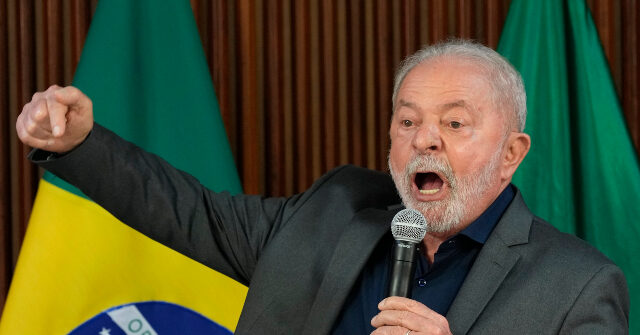Radical leftist President of Brazil Luiz Inácio Lula da Silva will not behave like his predecessor Jair Bolsonaro and “wag his tail” or say “I love you” to Washington in prospective U.S.-Brazil tariff talks, Finance Minister Fernando Haddad said on Tuesday.
Haddad spoke with CNN Brasil on Tuesday evening — days before a 50-percent tariff on Brazilian goods entering the United States is scheduled to go into effect on Friday, August 1. At press time, a delegation led by Brazilian Vice President Geraldo Alckmin is in the United States seeking to negotiate the upcoming tariffs.
Last week, Lula, during an official government event in which he ranted against Jair Bolsonaro, claimed he is willing to negotiate with President Donald Trump, asserting that Trump “doesn’t want to talk, if he wanted to talk he would pick up the phone and call me.”
Reports published by Brazilian outlets citing unnamed government sources indicated that communications channels with the White House are “closed” and Brazil’s Planalto presidential palace is experiencing “difficulties” in establishing a direct link with the core of the Trump administration.
Haddad told CNN Brasil on Tuesday that Lula will not behave “like Bolsonaro,” whose “witch hunt” was cited by President Trump as one of the reasons for the upcoming tariffs. The finance minister said that there must be a negotiation protocol to ensure that “what happened to [Ukrainian President Volodymir] Zelensky” at the White House does not happen to Lula in a prospective encounter with Trump.
The Ukrainian president, whose relationship with Lula is particularly acrimonious, endured an unpleasant experience at the White House in February; President Trump expelled him from the White House after he began arguing during a photo opportunity in front of reporters.

“Now, there has to be a protocol for that too, because you don’t want President Lula to behave like Bolsonaro did, wagging his tail and saying ‘I love you,’ saluting. President Lula, he has a different kind of profile,” Haddad said, a euphemism for Lula’s typically belligerent and antagonistic persona.
“And if there is a meeting between the presidents, a phone call between the presidents, we have to be sure that what happened to Zelensky, who made a fool of himself at the White House, will not happen to President Lula,” Haddad said.
“Everyone saw it. So, not everything goes well when trying. It’s not a question of that, it’s a question of two sovereign nations, two peoples represented. Either you show respect, some respect, or you will become a laughing stock,” he continued. “Now, what lack of commitment is the Brazilian government lacking? We have a vice president of the Republic who is the country’s minister of development, who is 100-percent committed.”
Haddad asserted that negotiation channels between Brazil and the United States are being “cleared” and reasoned that Brazil must be neither arrogant nor submissive. The minister further asserted that he believes that the Brazilian government has everything it needs to ensure that Friday, August 1, does not become a “fateful day.”
Haddad further argued during the interview that the United States does not seem to have “complete clarity” on President Trump’s tariff policies, stressing that Brazil is preparing a contingency plan to deal with the economic impacts of the upcoming 50-percent tariffs.
According to Haddad, the contingency plan would include workers’ protection measures similar to those implemented in Brazil during the Wuhan coronavirus pandemic, as well as credit lines for businesses most affected by the tariffs.
“We don’t know what measures will be taken by the U.S. government. You are judging the government as if the U.S. government knew what it was going to do this week. Not even the Secretary of State has complete clarity about what will happen,” Haddad said.
“We are confident that we have done a job that will enable Brazil to overcome this moment, which was not created by us,” he added at another point of the interview. “Brazil will be prepared to take care of its companies and its workers while remaining at the negotiating table, seeking rationality and mutual respect,” said the minister.”
In addition to the “witch hunt” against Bolsonaro, who stands accused by Brazil’s Supreme Federal Tribunal (STF) of plotting to stage a “coup” and overturn his narrow defeat against Lula in the 2022 presidential election, President Trump cited the attacks on free elections in Brazil and attacks against the fundamental right of free speech of Americans committed by the STF as reasons for the tariff.
Haddad told CNN Brasil that the United States cannot retaliate against Brazil due to the decisions of the Brazilian top court.
“How can a country comment on a ruling by the Brazilian Supreme Court? Imagine if it were the other way around, Lula saying ‘I’m going to retaliate against the US because of a ruling by the US Supreme Court?’” Haddad said, adding that the subject of Jair Bolsonaro is not under discussion in the negotiations between both countries.
Although President Lula publicly stated this month that he would impose reciprocal tariffs if the White House moved forward with its policy, Haddad asserted that “retaliating in kind” is not among the Brazilian government’s options for responding to the U.S. tariffs.
The finance minister claimed that the Trump administration could be “shooting itself in the foot” by taxing Brazilian products, arguing that it has the “potential” to increase the price of foods used in Americans’ daily lives. As such, Brazil “cannot make the opposite mistake, which would be to increase the cost of what contributes to improving the productivity of our economy.”
“The terms are being discussed, but we need to be very careful about this. Retaliating in kind is not being considered, as we are thinking about the Brazilian people,” Haddad said.
Christian K. Caruzo is a Venezuelan writer and documents life under socialism. You can follow him on Twitter here.
Read the full article here


